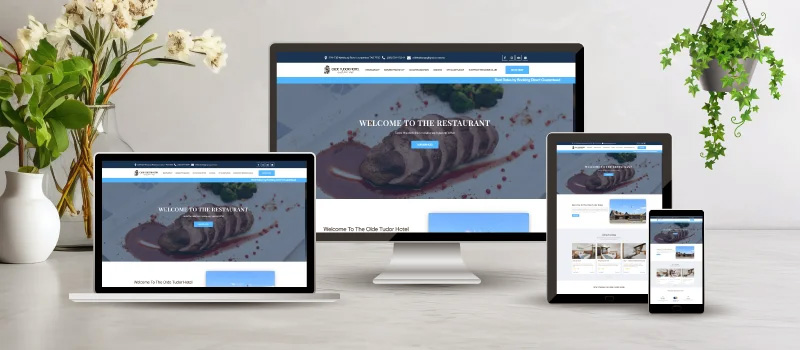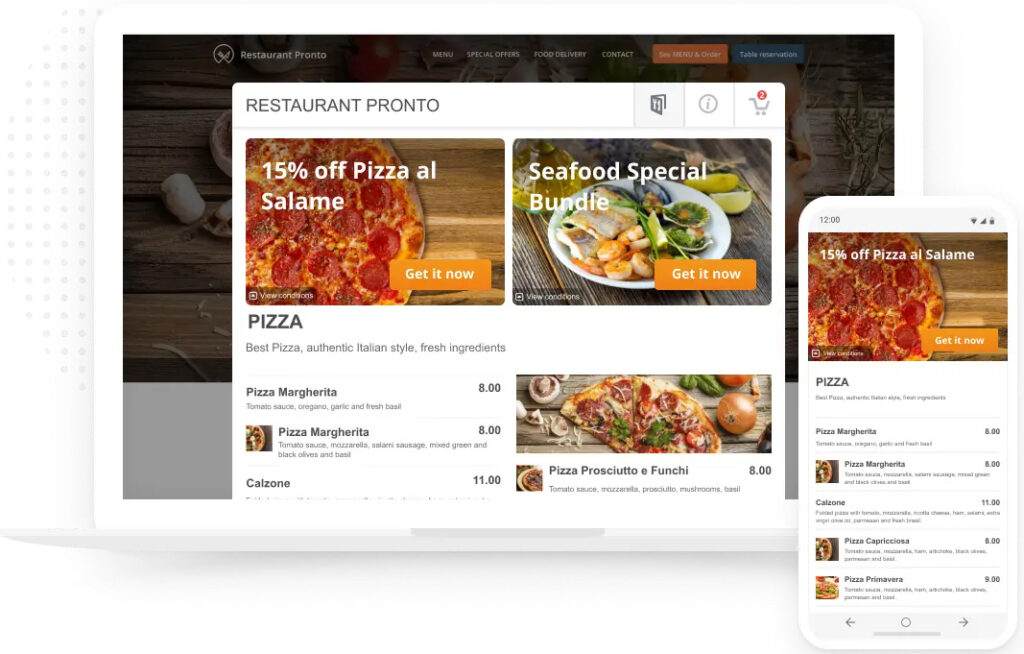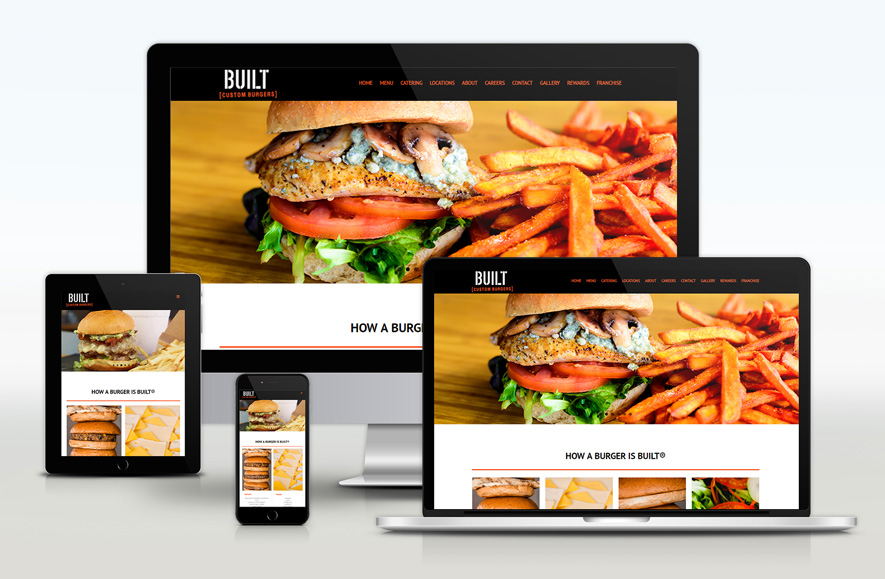
Restaurant Website Development
Restaurant website development is the process of designing and creating an online platform that represents a restaurant’s brand, menu, services, and ambiance. It goes beyond aesthetic appeal, focusing on functionality, user experience, and marketing.
Restaurant web portal development company acts as the most profitable business in all time. The GCTL is the leading IT development Company for the Restaurant web portal development company in Bangladesh. Our organization has an experience over the years with the certified team of best experts. Our hardworking and dedicated team promises our client with the best website. As there are numerous ways to deliver services to the restaurants, we are delightfully challenged to the various requirements that should be met to develop a restaurant web portal that would work best for our clients.
Why Do Restaurants Need a Website?
1. Enhance Online Presence
In an era where most people search online for dining options, a website is your digital storefront. A well-optimized website increases visibility and attracts potential customers.
2. Showcase Your Menu and Ambience
An attractive design that reflects the ambiance of your restaurant paired with an interactive menu can entice visitors to book a table or order online.
3. Streamline Reservations and Orders
Through proper restaurant website development software, you can integrate features like online reservations, food ordering, and payment options, improving customer convenience.
4. Build Trust and Credibility
Professional restaurant website design instills confidence. User reviews, testimonials, and a clear ‘About Us’ section reassure potential customers of the quality of your service.

Key Features of an Effective Restaurant Website
1. Mobile Responsiveness
With more than 60% of users browsing on mobile devices, a responsive website ensures that your site looks great on any screen size.
2. Online Menu Integration
Showcase your menu in a visually appealing way, allowing users to filter dishes, view images, and check prices.
3. SEO Optimization
Restaurant website development ensures your site ranks high in search engines by incorporating keywords like “Restaurant Website Design” and “Restaurants website development company in Bangladesh.”
4. Fast Loading Speed
Nobody likes waiting for a website to load. A fast-loading site reduces bounce rates and improves customer satisfaction.
5. Social Media Links
Integrate your social media platforms to engage with customers and share promotions.
Steps in Restaurant Website Development
1. Identify Goals and Target Audience
Understanding your audience is the first step in developing a restaurant website. Whether you’re targeting families, professionals, or foodies, your site should cater to their preferences.
2. Choose the Right Platform
Popular platforms like WordPress, Wix, or custom-coded solutions provide flexibility depending on your needs and budget.
3. Design and Development
Hire professionals or a restaurant website development company in Bangladesh to create a visually appealing design with smooth navigation.
4. Content Creation
Include compelling content such as an engaging ‘About Us’ page, high-quality images of dishes, and user-friendly menus.
5. Integration of Advanced Features
Utilize tools like restaurant website development software to enable online ordering, table booking, or loyalty programs.
Benefits of Hiring Professionals for Restaurant Website Development
1. Expertise in Industry Trends
Experienced developers understand restaurant-specific requirements like menu integration, reservation systems, and SEO optimization.
2. Time-Saving
Professional restaurant web design & development teams ensure your website is up and running quickly, allowing you to focus on your business.
3. Scalability
As your business grows, your website should evolve. Professionals design websites with scalability in mind, ensuring you’re future-ready.

Common Mistakes to Avoid in Restaurant Website Development
1. Ignoring Mobile Users
Not optimizing for mobile devices can alienate a significant portion of your audience.
2. Poor Navigation
If users struggle to find key information like your menu or contact details, they’ll leave your site frustrated.
3. Overloading the Website
Too many images, animations, or unnecessary plugins can slow down your website.
Restaurant Website Development Software: Tools and Technologies
- WordPress: Versatile and user-friendly for restaurant websites.
- Wix: An affordable solution for small restaurants.
- Custom CMS: For businesses with unique requirements, custom content management systems can be tailored to your needs.

How to Choose a Restaurant Website Development Company in Bangladesh
1. Check Their Portfolio
Review past projects to assess their expertise in restaurant web design & development.
2. Read Client Testimonials
Testimonials and case studies reveal their reliability and success in delivering results.
3. Look for Comprehensive Services
A good development company offers end-to-end services, from design to SEO optimization.
SEO Tips for Restaurant Websites
1. Optimize Keywords
Incorporate keywords like “What is Restaurant Website Development” and “Restaurant Website Design” naturally within your content.
2. Local SEO Matters
Optimize for local searches by including your location and setting up a Google My Business profile.
3. Use High-Quality Content
Create engaging blogs and share recipes, tips, or food stories to keep visitors returning to your site.

A restaurant website with a portal is a powerful tool that goes beyond a simple online presence. By integrating features like online reservations, ordering, loyalty programs, and customer feedback, restaurants can elevate the dining experience for customers. Additionally, the portal enables efficient management of reservations, orders, and customer data, streamlining restaurant operations.
To fully realize the benefits of a restaurant website with a portal, continuous efforts must be made to maintain and update the platform regularly. Leveraging SEO, online marketing, and data analytics ensures that the restaurant stays competitive in a digital-first era, attracting more customers and fostering loyalty among existing ones.
Embracing technology and the digital landscape not only opens up new revenue streams for restaurants but also creates a seamless and enjoyable dining journey for patrons. In an ever-evolving business landscape, a well-designed restaurant website with an integrated portal is a vital ingredient for success, allowing the establishment to thrive in a highly competitive market.
Restaurant website development with a portal represents a transformative step for modern dining establishments. The integration of online reservations, ordering, loyalty programs, and customer feedback empowers restaurants to enhance customer experiences and optimize operational efficiency. Additionally, leveraging data analytics and marketing strategies can attract new customers and retain existing ones in an increasingly competitive industry.
Summery
Restaurant website development is the cornerstone of a successful online presence in the food industry. Whether you’re attracting local diners or showcasing your culinary excellence to a global audience, a professionally designed website ensures you stay ahead in this competitive market. Partner with a trusted restaurant website development company in Bangladesh or elsewhere to create a site that drives growth, increases revenue, and delights your customers.
Frequently asked questions :
What is restaurant website development?
Restaurant website development is the process of designing and building a website that is specifically tailored for the needs of a restaurant or food service business.
What are the benefits of using a restaurant website for business?
Some benefits of using a restaurant website for business include increased online presence and visibility, improved communication with customers, 24/7 access to menu and ordering information, enhanced online ordering and payment capabilities, and improved customer data tracking and analytics.
What features should I look for in restaurant website development?
Some important features to look for in restaurant website development include a user-friendly menu with photos and descriptions, online ordering and payment options, responsive design for mobile devices, integrated contact and feedback forms, and integration with other business software such as inventory management and point-of-sale (POS) systems.
Can restaurant websites be optimized for search engines?
Yes, restaurant websites can be optimized for search engines through the use of techniques such as keyword research, Meta tags and descriptions, and improving website speed and performance. Additionally, restaurant websites can benefit from optimization for location-based search queries.
How much does restaurant website development cost?
The cost of restaurant website development can vary widely depending on the complexity and functionality of the website, as well as the expertise and hourly rate of the developer. Some businesses may be able to build a basic restaurant website using free templates, while others may need to invest thousands of dollars in custom website development.
Can restaurant websites integrate with other business software?
Yes, restaurant websites can integrate with other business software such as inventory management and POS systems. Additionally, restaurant websites can benefit from integration with third-party online ordering and delivery platforms.
Can restaurant websites be accessed and managed remotely?
Yes, restaurant websites can be accessed and managed remotely through the use of a back-end management system, which can be accessed from any device with an internet connection.
Is it difficult to learn how to manage a restaurant website?
The difficulty of managing a restaurant website can vary depending on the specific website and the user's level of experience with website management. However, many restaurant website development projects include training and support for website management and updates.
Can a restaurant website be updated or modified in the future?
Yes, a restaurant website can be updated or modified in the future to reflect changes in the business or organization, as well as changes in website design and development trends.

